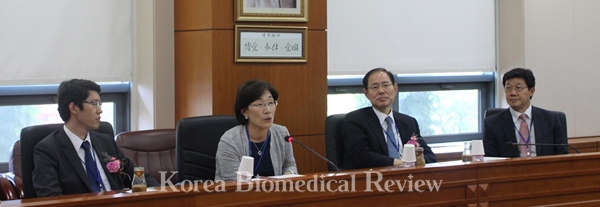If Korea wants to take the lead in the fourth industrial revolution era, the nation should standardize and enhance the openness of medical information, experts said Thursday.
Korean Society of Medical Informatics (KOSMI)대한의료정보학회 held an academic conference to discuss the direction Korea needs to lead the fourth industrial revolution. The conference has set the fourth industrial revolution as its theme, and share information on such sectors as making use of public healthcare big data, creating safety network in medical welfare, and promoting mobile health services.

“Healthcare field is the most important area in the fourth industrial revolution,” said KOSMI Chairman Park Rae-woong박래웅. “Particularly important is data, and Korea has good infrastructure in this regard, taking a top position in the penetration rates of EMR (Electronic Medical Record) and Picture Archiving and Communication System (PACS), and is friendly to new technology, too.”
Park went on to say, “Currently, the EMR distribution rate in the U.S. is higher than in Korea. The U.S. has improved the quality of medical information by providing incentives. The Korean government also has to make hospitals share data with others and provide incentives for them.”
For that purpose, however, the government needs to offer standardized EMR functions to accumulate medical information developed in each hospital, Park noted.
“The government, instead of trying to present a standardized system, should offer standardized functions and set minimum standards to meet,” Park said. “And it has to collect individual records and make a new platform to give the information for research purpose.”
Ryu Hee-sug유희석, president of KOSMI, also said the medical community should collect information now developed by individual hospitals. He also agreed on the need to resolve the two biggest tasks of openness and standardization, while pointing out the government’s excessive regulations should not stand in the way.
“Each hospital has its own characteristics with some unwilling to reveal their data. The quality of medical information also differs by hospitals. Most of all, regulations are one of the biggest barriers,” Ryu said. “The most important thing, however, is for the government to inject trust among people about the proper use of medical information and let them know research based on medical information will be in the best interests of people.”
Rho Yeon-hong노연홍, vice president of Gachon University, also made some suggestions for policymakers. “We need to be more active to accept the trend and take measures to produce positive results,” Roh said. “And the government should seek ways of global standardization and take appropriate actions to make medical information get on the right ethical and technological tracks. It has to take the lead from the broad perspective.”
Chairman Park Hyeoun-ae 박현애 of International Medical Informatics Association (IMIA)세계의료정보학회 stressed the importance of medical information standardization, too.
“A domestic company has developed the medical information platform and supplied it to hospitals. In Korea, however, medical information is formulated in each hospital, which monopolizes its data,” Park said. “Eventually, however, Korea has to follow global standardization. Currently, 30 countries, including the U.S., Canada, and Australia, have made standard terminologies and are using them. We are trying to make the Korean-style standard, which means we have fallen behind.”

